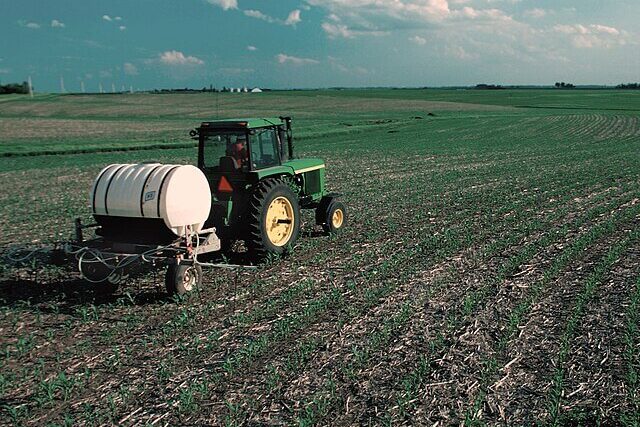
British farmers managed to achieve increased crop yields in the past year, despite facing significant reductions in fertiliser use.
This noteworthy development comes against the backdrop of skyrocketing fertiliser prices due to the geopolitical turmoil following Russia’s invasion of Ukraine. With the price of natural gas, a key component in artificial fertilizer production, surging, farmers faced soaring costs. Fertilizer prices more than tripled, jumping from £233 per tonne in 2020 to an astonishing £766 per tonne in 2022, leading to a reduction in their usage.
Data from the Department for Environment, Food and Rural Affairs (Defra), which was published recently, offers a fascinating insight into this situation. It reveals that for vital crops like wheat, barley, oilseed rape, and sugar beet, fertiliser usage witnessed an average decrease of 27% compared to the 2010-2019 average. However, despite this significant reduction, crop yields for these staples exceeded the average by 2.4% for the same period.
It’s important to note that one exception to this trend was the cultivation of potatoes, which saw a 10% increase in fertiliser usage but an 8.6% reduction in yield. This discrepancy highlights the complex relationship between fertiliser application and crop performance.
Fertiliser usage in agriculture has long been recognised as a major contributor to environmental pollution. In 2022, Defra’s findings indicated that agriculture was responsible for 40% of pollution in inland water bodies. This included an estimated 50% of nitrate pollution, 25% of phosphorus in water environments, and a staggering 75% of sediment pollution – all originating from agricultural activities.
Martin Lines, the CEO of the Nature Friendly Farming Network (NFFN), a group of farmers advocating for sustainability in the industry, emphasised how this data underscores the significant benefits of reduced fertiliser usage, both economically and environmentally. He pointed out that a substantial amount of fertiliser applied to UK fields doesn’t get absorbed by the crops, instead seeping into rivers and streams, further exacerbating environmental issues.
For many farmers like David Lord, based in Essex, the shift towards more natural fertilisation methods has been primarily driven by economic considerations. Over the past decade, Lord has reduced nitrogen usage on his farm by approximately 30%. He believes that the recent gas crisis has compelled farmers to adopt more environmentally efficient practices.
“People are learning that using less fertiliser opens up the opportunity to try more nature-friendly methods,” Lord said. “Artificial fertilisers have a cost to us as growers, but also to the climate.”
Artificial fertilisers can have detrimental effects on plants, and Andrew Mahon, an arable farmer in Bedfordshire, supports this view. Having reduced his use of artificial nitrogen by 15%, Mahon likened nitrogen fertilisers to “drinking four espressos in the morning” – they provide an initial boost but leave plants more susceptible to diseases afterward.
It is essential to note that the reduced fertiliser usage observed in 2022 may not be indicative of a long-term trend, and farmers like Lord and Mahon acknowledge that last year’s harvest was somewhat exceptional. Mahon said: “Crops were pretty good last year and there was so much sunlight. That is what drove yield last year.”
Both emphasise the importance of nitrogen in fertilisation, describing it as “essential to growing consistent live food” for farmers. However, they also acknowledge the need to use nitrogen more sparingly.
Lord expressed some frustration with the government’s restrictions on urea use, a common nitrogen-based fertiliser. Urea is a really important product,” he said. “If we didn’t have it, it would be more harmful for the climate.”
In 2022, the government announced restrictions on the use of untreated urea, limiting it from January 15th to the end of March each year. This measure was implemented to reduce the release of ammonia, a potent air pollutant, and to encourage more sustainable fertiliser application methods.
The shift away from heavy reliance on artificial fertilisers has prompted a return to mixed farming methods among farmers, according to Lord and Mahon. This approach incorporates livestock farming, which they believe is the most effective way to cycle nutrients into the soil. By doing so, farmers can decrease their reliance on artificial fertilisers without negatively impacting production, thus fostering a more sustainable and environmentally friendly agricultural sector.
——————————————————————————
At Natural World Fund, we are passionate about stopping the decline in our wildlife.
The decline in our wildlife is shocking and frightening. Without much more support, many of the animals we know and love will continue in their decline towards extinction.
When you help to restore a patch of degraded land through rewilding to forests, meadows, or wetlands, you have a massive impact on the biodiversity at a local level. You give animals a home and food that they otherwise would not have had, and it has a positive snowball effect on the food chain.
We are convinced that this is much better for the UK than growing lots of fast-growing coniferous trees, solely to remove carbon, that don’t actually help our animals to thrive.
This is why we stand for restoring nature in the UK through responsible rewilding. For us, it is the right thing to do. Let’s do what’s right for nature!
Donate today at https://naturalworldfund.com/ and join in the solution!

